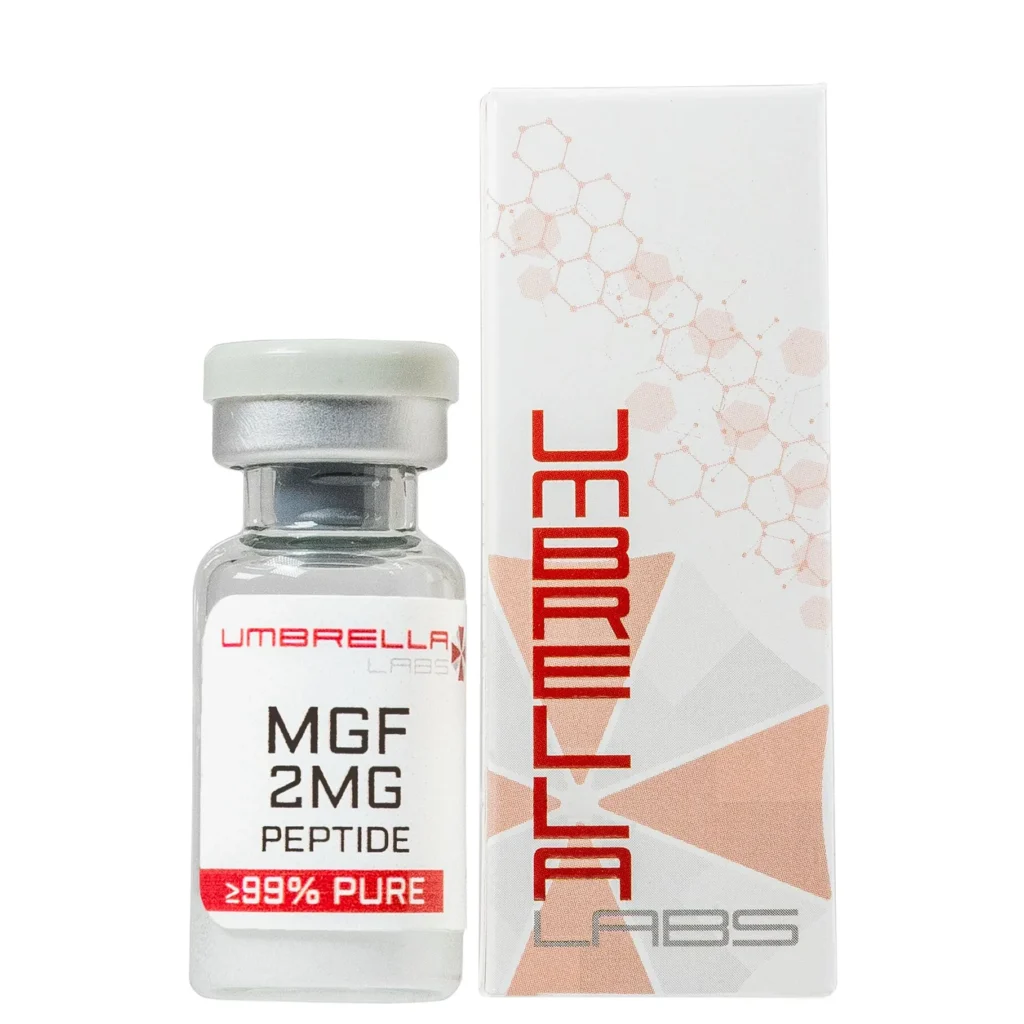
MGF, or Mechano Growth Factor, is a splice variant of IGF1 (Insulin-like Growth Factor 1) produced by muscle tissues in response to mechanical overload or damage. It plays a crucial role in muscle growth and repair by activating satellite cells, contributing to the development of new muscle fibers, and the restoration of damaged ones.
Mechanism of Action
MGF is unique because it’s activated by mechanical stimuli, such as resistance training or muscle damage. Upon activation, MGF initiates the upregulation of protein synthesis, leading to muscle growth and repair. It does this by activating muscle stem cells or satellite cells, prompting them to enter the cell cycle and differentiate into new muscle fibers. Additionally, MGF stimulates the uptake of amino acids into the muscle cells, further aiding in muscle growth and repair.
Benefits and Uses
Enhanced Muscle Growth: By stimulating satellite cells, MGF promotes the growth of new muscle fibers, contributing to increased muscle mass.
Improved Muscle Repair: MGF plays a significant role in the repair and recovery of muscle tissues damaged during intense physical activity.
Rapid Recovery from Injury: Its regenerative properties extend to accelerating the healing process of muscle injuries.
Potential Anti-Aging Effects: Through its muscle regeneration capabilities, MGF may also help counteract the loss of muscle mass associated with aging
MGF’s targeted approach to muscle growth and repair makes it particularly appealing for athletes, bodybuilders, and those recovering from muscle-related injuries.

Dosage and Cycle Guidelines
The standard dosage for MGF varies, with a common range being between 200-400 mcg per injection, administered postworkout to maximize its muscle repair and growth benefits. The peptide should be injected intramuscularly, directly into the muscle group that has been exercised.
A typical cycle might last 4-6 weeks, followed by a break or evaluation period to assess progress and adjust dosages as necessary. The frequency of administration is typically 2-3 times per week, immediately after a workout on training days.
Potential Side Effects
While MGF is generally well-tolerated, potential side effects may include:
Pain or Discomfort at Injection Site: Common with many injectable peptides.
Potential for Hypoglycemia: Similar to other IGF-1 variants, there may be a risk of lowering blood sugar levels.
Muscle Growth Imbalances: If injections are not administered evenly across muscle groups, it could potentially lead to imbalances in muscle growth.
Water Retention: Some users report experiencing mild water retention.
Given its potent effects on muscle growth and repair, MGF is a valuable tool for enhancing athletic performance and recovery. However, it’s crucial to use it responsibly, adhere to recommended dosages and cycle guidelines, and monitor for any adverse reactions. Consulting with a healthcare professional before starting any new peptide regimen is always advisable.
“Bionic SARMs”: Your Ultimate Guide.
Download Now!
This will close in 120 seconds
Underground Oral Steroid Handbook
Download Now!
This will close in 120 seconds
Underground Injectable Steroids Handbook
Download Now!
This will close in 120 seconds
Underground Peptides Handbook
Download Now!
This will close in 120 seconds
Secret to Mail Order Steroids 2024 Handbook
Download Now!
This will close in 120 seconds
Underground Steroid Cycles Handbook
Download Now!
This will close in 120 seconds
Beligas Pharmaceuticals 2024 Underground Guide
Download Now!
This will close in 0 seconds
The Nootropics Underground Handbook
Download Now!
This will close in 120 seconds
EUROPHARMA 2024 Steroid Handbook
Download Now!
This will close in 120 seconds
Para Pharma 2024 Steroid Guide
Download Now!
This will close in 120 seconds
Fitness and Performance Blueprint
Download Now!
This will close in 120 seconds
Geneza Pharmaceuticals Underground Steroid Catalog
Download Now!
This will close in 120 seconds
Lean Body Manual
Download Now!
This will close in 120 seconds
SARMs.co Research Guide
Download Now!
This will close in 120 seconds
Australian Labs Underground Guide 2025
Download Now!
This will close in 120 seconds


